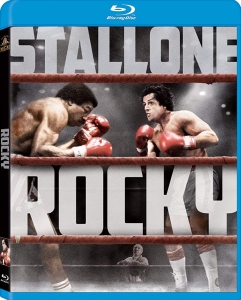The buzz is heating up for the seventh movie in a legendary film franchise that dates back to the 1970s. I’m referring, of course, to the “Rocky” series, which will continue with “Creed” on Nov. 25. (You want “Star Wars Episode VII” coverage? This isn’t the blog you’re looking for.) Let’s start the countdown with the original “Rocky” (1976).
“Rocky” is one of those magical, timeless films that has all its flaws (if there are any) smoothed over to become part of a perfect package. For example, Rocky wasn’t supposed to have the wrong colored boxing trunks in the poster at the arena and his robe wasn’t supposed to be baggy, but – because it was a low-budget production – those flaws were written into the script rather than fixed. In retrospect, it seems obvious that those details add character to the film, but the fact that they came about accidentally shows what a blessed picture this was.
My favorite character in “Rocky” is North Philadelphia, which is portrayed with beautiful ugliness. While some big interiors such as the arena and the skating rink were shot in Los Angeles, we see the real streets and living spaces of Philadelphia. Rocky’s apartment is a dump, with beer bottles stuffed between the couch and wall. When he guzzles an almost comical amount of eggs before his first training jog, he cracks them into a dirty glass atop the fridge. Rocky Balboa lives a parody of the bachelor lifestyle.
If it’s possible to look at shots of nothing more than streets and buildings and feel depressed, “Rocky” manages it with just a bit of dated, downbeat piano accompaniment before the context of the story is even in place. Mickey’s (Burgess Meredith) subtly desperate pitch to let him be Rocky’s trainer is made extra sad because of the Philly backdrop. The same can be said for every scene with Paulie (Burt Young), particularly the one where he smashes up his house with a baseball bat and chokes out to Rocky that he can’t stand another day of slinging slabs of meat at the warehouse.
Among human characters, I rank Adrian at the top. Talia Shire knows just when to avert her eyes from Rocky in a pitch-perfect portrayal of a desperately shy person (She possibly has Asperger’s, although that diagnosis wasn’t mainstream yet). Although Shire is pretty in a straightforward way, she’s not adorkably cute like a dressed-down Natalie Portman or Zooey Deschanel. She actually is awkwardly mousy enough that I almost wanted Rocky to give up on her and walk her home on their first date. Just cut your losses and maybe try another day. The fact that he sticks with it and succeeds in bringing Adrian out of her shell (no Cuff and Link pun intended) makes the romance all the more giggle-worthy.
Sylvester Stallone is unfairly labeled as a bad actor by some, perhaps because he has displayed a limited range in movies, but he is unquestionably perfect as Rocky. Of course, Stallone wrote the film with himself in mind for the title role, but still, this is a remarkably naturalistic performance. For example, when Rocky screams through the closed door about how he needed Mickey’s help 10 years ago, it’s a babbling rant, yet his words are discernible and the emotion is crystal clear. Some might say lightning (no “eating lightning and crapping thunder” pun intended) struck once for Stallone with “Rocky,” but I also think he’s outstanding in the criminally underrated “First Blood” (1982), where he shines as Rambo in a similarly epic babbling rant about warfare and the treatment of soldiers.

As I said, “Rocky” was touched by magic, so all its flaws got smoothed over. If there was a flaw, though, it might be that Apollo Creed simply picks Rocky as his opponent because he thinks the name “Italian Stallion” is marketable. Other than choosing that name for himself, Rocky does absolutely nothing to earn the fight against Creed. It’s similar to Season 1 of “Friday Night Lights,” where Dillon advances to the playoffs by winning a coin flip, but it’s even more of a lucky break because Rocky doesn’t win any required bouts to get on Creed’s radar. Apollo just pages through a boxing guide and finds him. And Rocky gets $150,000 just for fighting; strictly speaking, “Rocky” is the story of an Average Joe who wins the lottery, and we have to wait until “Rocky II” to see what he does with his winnings.
On the flip side, the fact that Rocky loses to Apollo is crucial to why the film works. The theme is telegraphed in an earlier scene where Rocky tells Adrian he just wants to go the distance, but still, Stallone had to be tempted to script it so Rocky wins with a stunning knockout. (The first season of “FNL” couldn’t resist this temptation, having Dillon win the state title when it probably would have been a better story to have them lose that first year.) Not only does Rocky lose, but it’s not clear that he loses: In the background of Rocky and Adrian shouting their love for each other, the PA man announces a split decision in favor of Creed. It’s very possible that theater-goers missed that and there was confusion about the result in those days before IMDB. Still, in its muddled presentation, “Rocky’s” conclusion emphasizes the point that the fight’s outcome doesn’t matter; all that matters is that Rocky went the distance and he and Adrian love each other.
“Rocky’s” message – despite the iconography of Rocky punching the air atop the Museum of Art steps — is not that hard work and determination pays off. Rather, the message is that nice guys don’t always finish last. Despite working as a loan shark’s collection agent, Rocky is consistently portrayed as a good guy; not a bad guy with a heart of gold, but a pure good guy. Rocky can’t bring himself to break the debtor’s thumbs. He gives helpful advice to a teenage girl with a potty mouth, then when she rejects his well-meaning words on account of he himself being a street rat who barely scrapes by, he decides she has a point. He’s mostly well liked on the streets, but he doesn’t have a fan base (he keeps telling casual supporters “You shoulda been there”) until he gets his lucky break to represent Philly in the bicentennial fight. He’s not beloved until he pushes Creed the full 15 rounds.
Mickey and Paulie broadly fit into the “maybe good guys can catch a break” arc, too, except that one could argue those characters don’t earn it. Mickey ends up giving Rocky the smart training method of tying a rope to his feet so he learns balance. But he becomes helpful after Rocky wins Creed’s lottery. There’s not a single scene before that of Mickey being a decent human being to Rocky. Mickey is just a curmudgeon, and not a loveable one with a secret heart of gold but more of a true a–h— who uses and discards pugilists for his own benefit. The scene where Rocky changes his mind and hires Mickey as his trainer is wordless and shot from a distance. While it’s an artistic streetlamp-lit shot, it might also have been staged silently because really, that conversation isn’t going to be profound. Mickey didn’t do anything to earn the job, and Rocky is just being a nice guy again.
Paulie is loathed by some viewers, but I am willing to be sympathetic to Rocky’s assertion that his friend is a good guy, deep down. True, Paulie whines about wanting Rocky to get him a job with the loan shark, he whines about having to take care of Adrian, and he is truly rude to his sister and speaks crassly about her to Rocky. But his actions provide nuance that contrasts with his unappealing personality: He does encourage the awkward Rocky and shy Adrian to go on their first date when it probably wouldn’t have happened without his blunt approach of throwing out the turkey and demanding they leave his house. And he can tell Adrian is crazy about Rocky; he is rude to her face, but he knows his sister pretty well, and that’s quite possibly a sign he cares for her. The day after his lamp-smashing rant with the baseball bat, he seeks out Rocky at the gym to apologize (in his own way – note how he jumps to help Rocky remove his gloves). One could even argue that the lamp-smashing rant is a subconsciously calculated way to get Adrian to move in with Rocky so they can take another step toward happiness with each other.
Apollo Creed (Carl Weathers) is an over-the-top, glistening specimen in this first movie, a carnival-barking cartoon mixed with athletic perfection. Creed – and particularly his ring entrance in red, white and blue George Washington garb — is the biggest tip-off that there will be a string of sequels featuring colorful opponents with deliciously evocative names and billboard-sized personalities.
Of course, “Rocky” was a low-budget film with no stars that was not expected to do much box-office business (It ended up being the highest-grossing movie of 1976). So, although the era of sequels had already begun (notably with the “Planet of the Apes” franchise), “Rocky” was not made with follow-ups in mind. That having been said, when Apollo says there won’t be a rematch and Rocky says he doesn’t want one, it plays like a purposely ironic nod to the audience that there will of course be a sequel.
Maybe Stallone believed in the movie deep down, despite the odds. If so, it adds to “Rocky’s” parallel story behind the story. While the film’s narrative is a fictional account of overcoming long odds in a sporting event, the film itself is a real-life story of overcoming long odds in Hollywood. In a weird way, that gives verisimilitude to everything on screen and allows “Rocky” to be a calculated underdog story while at the same time legitimately standing for nearly 40 years as an inspiring American classic.
More “Rocky”/”Creed” reviews:

